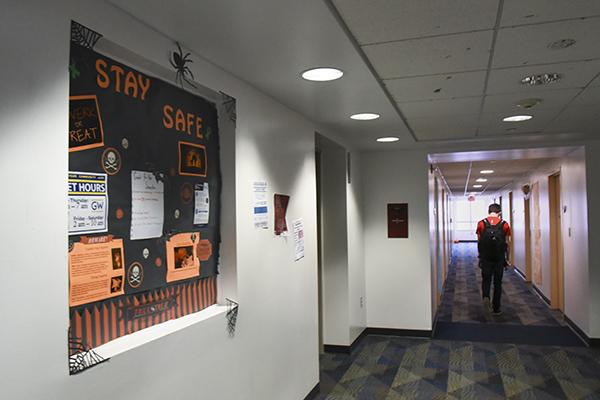
Updated: Nov. 9, 2015 at 10:20 a.m.
Resident advisers may have to take a training course starting in the spring of 2017.
That proposed course, the first of its kind for RAs at GW, is a reversal of a previous decision that would have had RAs starting the class next fall. While no details about the courses are finalized, some students said the mandated course is an unfair addition on top of their other mandated responsibilities and blurs the line between being a student and an employee.
Officials changed their minds about the class starting next fall after a heated meeting with RAs last month, where the students pushed back against the additional responsibility, saying it was asking too much of them. The pushback reveals a disconnect one current RA said has always existed between the University’s expectations of its on-the-ground representatives and the realities of actually executing those tasks.
University spokesman Kurtis Hiatt declined to say who would teach the course, if the course would count toward the number of credits students are permitted to take without paying additional fees and if current RAs would be required to take the course.
“The class is still under development and we don’t have any additional details to share at this time,” Hiatt said.
Associate Dean of Students Tim Miller, who oversees RAs, declined to comment for this story.
RAs have become increasingly important over the last several years, and are often the first point of contact to handle student crises in residence halls. This year, RAs received increased training about how to respond to a sexual assault allegation and are often the first University representative to reach out after a student is treated by EMeRG.
Last year, Title IX Coordinator Rory Muhammad called for more sexual violence training for RAs after a campus climate survey showed a quarter of undergraduate respondents told housing staff about unwanted sexual experiences first. After the release of that survey, Miller said RAs were “the front line staff for the Center for Student Engagement in GW’s residential communities.”
The CSE employs about 100 RAs, who must host a certain number of events for their student residents each semester. They also arrive at school two weeks before the fall semester for training, attend monthly meetings with CSE staff and participate in training over winter break. In return, they receive free housing, which can cost upward of $14,000 per year.
The cost per credit hour at GW is roughly $1,500, so a required two-credit class would be like taking about $3,000 away from an RA’s compensation. One resident adviser said if the class were required next year, it could impact some resident advisers’ abilities to graduate on time.
In an Oct. 22 email obtained by The Hatchet, which followed a contentious meeting after students lashed out about the mandate, Miller apologized for the way the class was presented to current RAs interested continuing their role next fall.
“Friday’s meeting was incredibly challenging for me and I am very concerned about the feelings many of you seem to have about how we value you in your role as RAs. While I know that many of you have concerns about the RA Class as proposed, it became obvious to me that there is more to these concerns than just the class,” the email reads.
Two weeks later, in a Nov. 5 email obtained by the Hatchet, Miller said the senior leadership team in the CSE decided not to run the class this spring, but would instead plan for it to be “part of the experience” for resident advisers in spring 2017. He also thanked resident advisers for their candor in meetings with him held throughout the week.
“This course will be most effective if students take it prior to the start of their time as RAs to help prepare them for the role and to not add this expectation while they are already incredibly busy functioning in their roles as RAs,” the email reads.
One current RA, who spoke on the condition of anonymity because RAs are not authorized to speak with the media, said that asking RAs to take on more responsibilities indicates that the CSE does not prioritize RAs’ roles as students, despite claims from administrators that RAs are primarily students, not employees.
“If you’re part of a student organization or in a department, and are hired by the University, they tell you that your academics come first and your job comes second. It really doesn’t feel like that’s the case anymore,” the RA said.
The RA said more training could be useful for more complicated situations where an RA may take on the role of a counselor. But the RA said that training should be conducted during the advisers’ weekly meetings and not as an additional class.
“I don’t doubt that having increased training, beyond the few weeks we get in the beginning of the summer, would help us out,” the RA said said. “I’m sure it would. I just think that the point at which it begins to intersect your life as a student is really where the line should be drawn.”
This post was updated to reflect the following correction:
The Hatchet incorrectly reported that the class had been proposed to start in spring 2015. The class had been proposed to start in fall 2016. The CSE also does not employ more than 100 RAs – that number is roughly 100. We regret these errors.







